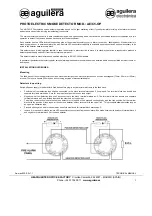
9
to minimise nuisance alarms avoid these locations:
•
Do not install within 0.9m of the following: the door to a kitchen, or a bathroom that contains a tub or shower, forced
air supply ducts used for heating or cooling, ceiling or whole house ventilating fans, or other high air-flow areas.
•
Areas where curtains or other objects will block the sensor. Smoke must be able to reach the sensor to accurately
detect conditions.
•
Install at least 30cm away from fluorescent lights.
•
Keep out of insect infested areas.
•
Avoid excessively dusty, dirty or greasy areas.
•
Do not install in areas where the temperature is colder than 0°C or hotter than 40°C.
•
Do not install in areas where the relative humidity (RH) is greater than 93%.
•
If a kitchen alarm is desired, it should have an alarm silencer feature or be a photoelectric type.
•
Do not place in the garage.
•
Avoid dead air spaces such as the peak of an “A” frame ceiling. “Dead Air” at the top may prevent smoke from reaching
the alarm in time to provide early warning. Refer to Figures 6.2 A and 6.2 B.
N.B. - Smoke alarms are not to be used with detector guards unless the combination (alarm and guard) has been
evaluated and found suitable for that purpose.
mobile home Installation
For Well Insulated Mobile Homes
Install smoke alarms as recommended on the previous pages. In mobile homes that are not well insulated extreme heat
or cold can be transferred from the outside to the inside through poorly insulated walls and roof. This may create a ther-
mal barrier which can prevent the smoke from reaching an alarm mounted on the ceiling.
For Poorly Insulated Mobile Homes
Install the smoke alarm on an inside wall with the top edge of the alarm at a minimum of 10cm and a maximum of 30cm
below the ceiling (Figure 6.2A).
For minimum protection, install at least one alarm close to the bedrooms. For additional protection, see Figure 6.1 A.
WArnIng: test yoUr AlArm oPerAtIon AFter mobIle home hAs been In storAge or
UnoccUPIed, And At leAst once A WeeK dUrIng Use.










































